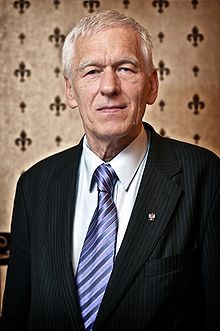Kornel Morawiecki
| Kornel Morawiecki | |
|---|---|
 |
|
| Senior Marshal of the Sejm | |
|
Assumed office 12 November 2015 |
|
| Chairman of Freedom and Solidarity | |
|
Assumed office 18 May 2016 |
|
| Chairman of the Freedom Party | |
|
In office 7 July 1990 – 25 September 1993 |
|
| Personal details | |
| Born |
3 May 1941 Warsaw, Poland |
| Spouse(s) | Anna Morawiecka |
| Children | Mateusz Morawiecki |
| Alma mater | University of Wrocław |
Kornel Morawiecki (born 3 May 1941, Warsaw) was the founder and leader of Fighting Solidarity (Polish: Solidarność Walcząca), one of the more radical splinters of the Solidarity movement in Poland during the 1980s. His academic background is that of a theoretical physicist. He is also a member of Polish Parliament, serving his 8th term of office.
He was the son of Michał and Jadwiga (née Szumańska). He graduated from the gimnazjum of Adam Mickiewicz in 1958 in Warsaw. He finished a higher degree in physics at the University of Warsaw in 1958. He completed his doctorate under Jan Rzewuski in Quantum Field Theory in 1970. He worked as a researcher at the University of Wrocław, at first in the Institute of Physics, and later in Mathematics. After 1973, he worked at the Wrocław Polytechnic.
In 1968 he took part in student strikes and demonstrations. After the repression of the student protests, together with a group of close friends he edited, printed, and distributed pamphlets which denounced the Communist government for their repressions against the protesting students.
Since 1979, he became the editor of the Biuletyn Dolnośląski (Lower Silesian Bulletin) together with Jan Waszkiewicz, an underground newspaper. He was a delegate to the First National Congress of NSZZ Solidarity.
At the end of May 1982, together with Paweł Falicki, he founded the "Organization of Fighting Solidarity" which was a unique political opposition organization in Poland and the countries of the Soviet Bloc. It was the only group which from the beginning of its existence called for an end to communism in Poland and other Soviet satellites, the establishment of sovereign governments independent from Moscow therein, the breakup of the Soviet Union and separation of the USSR republics into new nation states, and the reunification of Germany within its Potsdam-imposed borders. While eventually all these things did in fact come to pass, at the time this program was seen as quite radical and unrealistic, even in dissident circles.
...
Wikipedia
